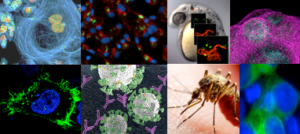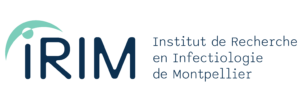Deadline Extended! Call for Group Leaders
The IRIM is Recruiting a Group Leader in Infection Biology

Internationally recognized for excellence in infectious diseases research, the Institute for Research in Infectious Diseases of Montpellier (IRIM) is a research institute affiliated with the French National Center for Scientific Research (CNRS) and the University of Montpellier, situated in Southern France.
Since its establishment in 2017, IRIM has grown to house 11 research teams, comprising over 120 scientists, including staff scientists, postdoctoral fellows and PhD students from across the world and support personnel. The institute provides a stimulating scientific environment, underpinned by several state-of-the-art on-site core facilities. These include the BSL3 CEMIPAI facility and access to 18 advanced technological platforms offered by Biocampus. Facilities comprise advanced imaging and screening (MRI), genomic collections (MGC), zebrafish and Xenopus breeding (ZEFIX), along with cutting-edge proteomics and genomics. IRIM collaborates closely with neighboring CNRS biology institutes on the same campus, such as the CRBM (Cell Biology) and IGMM (Molecular Genetics), creating a vibrant community of over 450 biologists. Additionally, it is located on the same CNRS campus as institutes focusing on ecology (CEFE) and chemistry (Pôle Balard), adding another 900 researchers to this multidisciplinary research ecosystem. IRIM’s strategic location near the University of Montpellier, which offers comprehensive programs in Life Sciences, health, engineering, and technology, further fosters cross-disciplinary collaboration.
To enhance its dynamic, collaborative, and innovative research atmosphere, IRIM is looking for an outstanding early to senior group leader in infection biology. The ideal candidate will lead research efforts to uncover pathogen virulence mechanisms, dissect host-pathogen interactions, drug resistance mechanisms or advance immunity against infectious agents. This position offers a unique opportunity to direct a high-impact research program at a premier institute, promoting interdisciplinary collaboration and innovation within a dedicated scientific community focused on transformative discoveries in infection biology.
Candidates are expected to develop competitive, independent research and meet the criteria for successful applications to national and international fundings, including ATIP-Avenir, FRM, ANR, ERC , or equivalent grants. Candidates who do not already hold a permanent CNRS position will benefit from dedicated support and mentoring within IRIM to enhance their competitiveness in securing a permanent research position, including tailored guidance on grant applications, career development strategies, and integration into national and international research networks. IRIM is committed to equal opportunity and encourages applications from all eligible candidates including from under-represented communities.
Starting Package: Successful candidates will receive a starting package that includes office and lab space and seed funding.
Applications (in English) should be submitted as a single file named LASTNAME_IRIM2024.pdf to by March 28, 2025. The file should include: (i) a cover letter, (ii) a CV with a complete list of publications, (iii) two reference contacts, (iv) a summary of past achievements (2 pages), and (v) a future research project (3 pages).
Tentative Calendar:
Application deadline: March 28, 2025
April: Preselection of candidates
May 2025: Interview of preselected candidates by the international selection committee and outcome of the selection process.
New Group Leaders will be able to start their projects starting from early 2026.
About Montpellier:
Montpellier is a significant research hub in France, attracting a large number of students, including many international scholars. The city hosts over 70,000 students, with around 5,000 international students each year, making it one of the country’s most dynamic academic centers. Montpellier’s strong focus on research is evident through its 75 research institutes, including prestigious institutions like the University of Montpellier and several CNRS centers. The city’s research output excels in fields such as life sciences, medicine, and environmental studies. Montpellier ranks among the top cities in France for research funding and scientific publications, thus drawing students interested in engaging in innovative, high-impact research projects in a collaborative and interdisciplinary environment. Additionally, the city’s Mediterranean location, cultural diversity, and excellent quality of life make it an attractive destination for students seeking both academic and personal growth.

